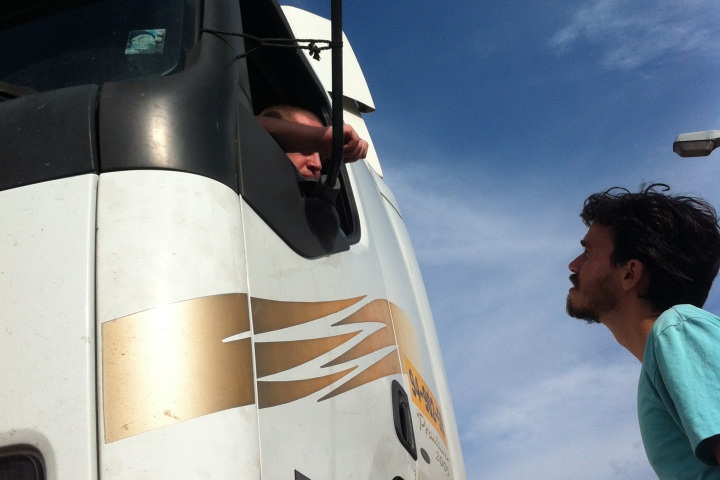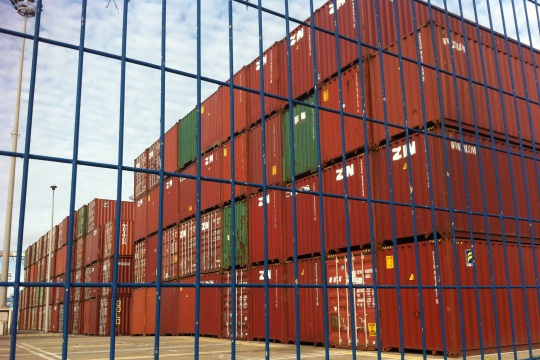The solitary work of a trucker entails long hours, poor pay and dangerous conditions. One trade union is attempting to organize drivers in a sector which is crucial to the Israeli economy.
By Alon Aviram
Haifa – At the largest of Israel’s seaports, heavy haulage trucks operate day and night, continuously working to transport imports and exports across the country. A stench of diesel fumes hangs in the port, and the sounds of shifting gears and screeching brakes are constant. Over 10,000 heavy vehicle drivers are employed in haulage in Israel. Unionization is scarce, and work conditions are grizzly.
Long working hours and poor pay characterize the Israeli trucking sector. Drivers are allowed by law to work up to 68 hours a week, 20 hours more than their EU counterparts. Although Israel regards the European transport regulations and rules as the standard for its transport industry, it deviates from many.
Laxly enforced regulations have reportedly led to truckers in Israel systematically being made to work overtime. Research by three Israeli scholars attributed work-induced fatigue to the fact that truck drivers are involved in 20 percent of all fatal road traffic accidents, despite constituting only 6 percent of all vehicles on the road.
Assaf Adiv, 59, is the national coordinator of the independent representative workers organization Wac-Maan (Workers Advice Center). Wac-Maan is an Israeli trade union which works in a number of different sectors including agriculture, construction and trucking. Central to its mission is its active support for unionizing workers regardless of nationality, religion or gender.
Assaf spoke of how the long hours that typify trucking are not only unsafe; they make normal life impossible. “The driver has one day off, Saturday, to sleep. It creates a situation that kills their personal life. Divorce rates and levels of depression among truckers are high because of this,” he continued. Yoav Tamir, 30, a full-time activist for Wac-Maan, describes the case of a newlywed trucker: “In order to spend any time with his wife, he brought her on rides with him while working, because he just couldn’t get out of the truck.”
Truckers are paid according to a “premium system.” Unlike other professional workers, they receive minimum wage, and an additional wage according to the volume of their work. Wac-Maan argues that this system forces truckers to take risks that an hourly wage earner would not. For this reason, this very payment method is prohibited under EU transport regulations.
“This payment system makes the driver work in a way which is unsafe; they drive faster and spend less time ensuring that hauls are safely loaded” said Assaf. “A year ago, I told a driver that the iron he had loaded on his truck wasn’t safe. He told me he had to go. I later found out that it went through his cabin and killed him.”
For the past three years, in both Haifa and Ashdod ports, Wac-Maan has been working to unionize truck drivers and defend them on a case-by-case basis in labor courts. As Yoav stood next to the port gates in Haifa, he spoke of his work, “I’m down in the port two days a week talking with truck drivers. We inform them of their labor rights and offer legal support. Many don’t read Hebrew, so they have difficulties understanding their contracts.” He added, “Just today, our lawyer won NIS 50,000 in compensation for Amos Michelle, a truck driver who was dismissed by his employer without receiving pension or severance pay.”
Yoav craned his neck upward to speak to tired looking drivers from their cabins. Dennis (not his real name), a Russian driver, seemed skeptical as Yoav spoke of the importance of unionization and challenging current work conditions. “If I changed companies I would get paid the same rate, and if I went on strike, I would probably get fired and possibly blacklisted by other companies.” Some of the truckers believe that there is a wage cartel between trucking companies, which suppresses drivers’ incomes.
Wac-Maan’s labor rights pamphlets are printed in Arabic, Hebrew and Russian. Unlike many of the other labor intensive sectors in Israel, which are usually dominated by Arab or immigrant labor, “Jews and Arabs work together in the same conditions,” said Assaf. Yet racial tensions are prevalent in the trucking world, just as they are across Israel. “What do you think would happen if we went on strike? The Arabs would just come in and replace us,” said Dennis.
“Deteriorating work conditions in trucking are part of the general neo-liberal shift that Israeli governments have pursued nationally in the past two decades,” Assaf argues. As is the case globally, there has been a massive decline in levels of unionization, widespread privatization, and less social entitlements for workers. In this particular sector, neo-liberal policies have created a situation in which there is an unusual symmetry in poor labor conditions between Jews and Arabs.
“I can only trust a few of the other workers; someone would tell the boss if we tried starting a union. We’d get fired before we could start,” said Jamil (not his real name), a truck driver from his cabin.
“The biggest objective obstacle is the low self-esteem of truckers, the frustration, despair, the feeling that they are completely on their own,” Assaf says. Truck driving is solitary work. “It’s totally different from your normal shop or factory floor environment,” said Yoav as he meandered through parked tucks looking for drivers. Lunch breaks are on the sides of highways, and contact between truckers is confined to monitored radios, or whilst waiting to load and unload in the port.
Wac-Maan hasn’t managed to organize a workers committee in one of the trucking companies. However, “we have a database of over 1,500 drivers, of workers who approached us, who took legal advice from us, who we represented,” Assaf said.
Situated in a rundown working class neighborhood, Yoav spoke of how “Wac-Maan’s office is becoming very well known to drivers from Haifa port.” Cases such as that of Yitzhak Ben Shimon bolster support for the organization. Yitzhak had been working for 20 years for the Itzhaki transport company, and the owner refused to pay him a salary he was entitled. Wac-Maan won the driver NIS 50,000 in compensation in an out of court settlement.
In many respects, Wac-Maan’s inability to establish worker committees in trucking companies is reflective of the fact that no union in Israel has attempted to do what it is doing. “We are very active in the ports with the drivers. But we haven’t seen any initiative by the Histadrut (the general confederation of Israeli workers) to organize truckers, despite pervasive poor labor conditions,” said Yoav. Wac-Maan seems to be working on its own in an attempt to establish a culture of unionization in a sector which is heavily privatized, and is subject to complex regulations which make legal challenges difficult.
Assaf and Yoav, alongside the legal department and the rest of the organization’s staff, understand the mammoth task before them, attempting to create grassroots worker committees for both Jewish and Arab workers in a crucial sector to the Israeli economy. “Once we can establish a committee in one company, to protect its drivers from the anarchy of long working hours, poor safety conditions, and lack of social and economic rights, then a precedent will be set and others will follow,” said Assaf.


